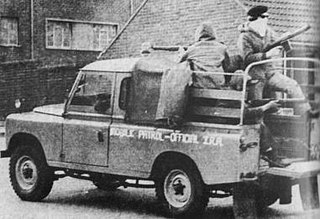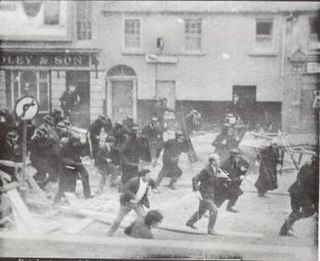Contents
| |||||
| Centuries: | |||||
|---|---|---|---|---|---|
| Decades: | |||||
| See also: | |||||
Events during the year 1997 in Northern Ireland .
| |||||
| Centuries: | |||||
|---|---|---|---|---|---|
| Decades: | |||||
| See also: | |||||
Events during the year 1997 in Northern Ireland .

The Provisional Irish Republican Army, officially known as the Irish Republican Army and informally known as the Provos, was an Irish republican paramilitary force that sought to end British rule in Northern Ireland, facilitate Irish reunification and bring about an independent republic encompassing all of Ireland. It was the most active republican paramilitary group during the Troubles. It argued that the all-island Irish Republic continued to exist, and it saw itself as that state's army, the sole legitimate successor to the original IRA from the Irish War of Independence. It was designated a terrorist organisation in the United Kingdom and an unlawful organisation in the Republic of Ireland, both of whose authority it rejected.
The Real Irish Republican Army, or Real IRA (RIRA), was a dissident Irish republican paramilitary group that aimed to bring about a United Ireland. It was formed in 1997 following a split in the Provisional IRA by dissident members, who rejected the IRA's ceasefire that year. Like the Provisional IRA before it, the Real IRA saw itself as the only rightful successor to the original Irish Republican Army and styled itself as simply "the Irish Republican Army" in English or Óglaigh na hÉireann in Irish. It was an illegal organisation in the Republic of Ireland and designated a proscribed terrorist organisation in the United Kingdom and the United States.

The Troubles were an ethno-nationalist conflict in Northern Ireland that lasted for about 30 years from the late 1960s to 1998. Also known internationally as the Northern Ireland conflict, it began in the late 1960s and is usually deemed to have ended with the Good Friday Agreement of 1998. Although the Troubles mostly took place in Northern Ireland, at times violence spilled over into parts of the Republic of Ireland, England, and mainland Europe.

The Official Irish Republican Army or Official IRA was an Irish republican paramilitary group whose goal was to remove Northern Ireland from the United Kingdom and create a "workers' republic" encompassing all of Ireland. It emerged in December 1969, shortly after the beginning of the Troubles, when the Irish Republican Army (IRA) split into two factions. The other was the Provisional IRA. Each continued to call itself simply "the IRA" and rejected the other's legitimacy.

Northern Ireland is one of the four countries of the United Kingdom, situated in the north-east of the island of Ireland. It was created as a separate legal entity on 3 May 1921 under the Government of Ireland Act 1920. The new autonomous Northern Ireland was formed from six of the nine counties of Ulster: four counties with unionist majorities – Antrim, Armagh, Down, and Londonderry – and two counties with slight Irish nationalist majorities – Fermanagh and Tyrone – in the 1918 General Election. The remaining three Ulster counties with larger nationalist majorities were not included. In large part unionists, at least in the north-east, supported its creation while nationalists were opposed.
The Northern Ireland peace process includes the events leading up to the 1994 Provisional Irish Republican Army (IRA) ceasefire, the end of most of the violence of the Troubles, the Good Friday Agreement of 1998, and subsequent political developments.
Events from the year 1997 in Ireland.

Free Derry was a self-declared autonomous Irish nationalist area of Derry, Northern Ireland that existed between 1969 and 1972 during the Troubles. It emerged during the Northern Ireland civil rights movement, which sought to end discrimination against the Irish Catholic/nationalist minority by the Protestant/unionist government. The civil rights movement highlighted the sectarianism and police brutality of the overwhelmingly Protestant police force, the Royal Ulster Constabulary (RUC).

Ulster loyalism is a strand of Ulster unionism associated with working class Ulster Protestants in Northern Ireland. Like other unionists, loyalists support the continued existence of Northern Ireland within the United Kingdom, and oppose a united Ireland independent of the UK. Unlike other strands of unionism, loyalism has been described as an ethnic nationalism of Ulster Protestants and "a variation of British nationalism". Loyalists are often said to have a conditional loyalty to the British state so long as it defends their interests. They see themselves as loyal primarily to the Protestant British monarchy rather than to British governments and institutions, while Garret FitzGerald argued they are loyal to 'Ulster' over 'the Union'. A small minority of loyalists have called for an independent Ulster Protestant state, believing they cannot rely on British governments to support them. The term 'loyalism' is usually associated with paramilitarism.

From 1969 until 1997, the Provisional Irish Republican Army (IRA) conducted an armed paramilitary campaign primarily in Northern Ireland and England, aimed at ending British rule in Northern Ireland in order to create a united Ireland.
The following outline is provided as an overview of and topical guide to the Troubles.

During 12–16 August 1969, there was an outbreak of political and sectarian violence throughout Northern Ireland, which is often seen as the beginning of the thirty-year conflict known as the Troubles. There had been sporadic violence throughout the year arising out of the Northern Ireland civil rights campaign, which demanded an end to discrimination against Catholics and Irish nationalists. Civil rights marches had been attacked by Protestant loyalists, and protesters often clashed with the Royal Ulster Constabulary (RUC), the overwhelmingly Protestant police force.
Billy McKee was an Irish republican and a founding member and leader of the Provisional Irish Republican Army.
Events during the year 1989 in Northern Ireland.

The Belfast Brigade of the Provisional IRA was the largest of the organisation's brigades, based in the city of Belfast, Northern Ireland.
The city of Derry, Northern Ireland, was severely affected by the Troubles. The conflict is widely considered to have begun in the city, with many regarding the Battle of the Bogside in 1969 as the beginning of the Troubles. The Bloody Sunday incident of 1972 occurred in Derry, in the Bogside area.

From 6 to 11 July 1997 there were mass protests, fierce riots and gun battles in Irish nationalist districts of Northern Ireland. Irish nationalists/republicans, in some cases supported by the Provisional Irish Republican Army (IRA), attacked the Royal Ulster Constabulary (RUC) and British Army. The protests and violence were sparked by the decision to allow the Orange Order to march through a Catholic/nationalist neighbourhood of Portadown. Irish nationalists were outraged by the decision and by the RUC's aggressive treatment of those protesting against the march. There had been a bitter dispute over the march for many years.

Raymond Elder was a Northern Irish loyalist paramilitary and a prominent figure within the Ulster Defence Association's South Belfast Brigade. Suspected by security forces of playing a role in numerous killings, including the Sean Graham shooting, he was shot dead by the Irish Republican Army on the Ormeau Road in 1994.

The Troubles of the 1920s was a period of conflict in what is now Northern Ireland from June 1920 until June 1922, during and after the Irish War of Independence and the partition of Ireland. It was mainly a communal conflict between Protestant unionists, who wanted to remain part of the United Kingdom, and Catholic Irish nationalists, who backed Irish independence. During this period, more than 500 people were killed in Belfast alone, 500 interned and 23,000 people were made homeless in the city, while approximately 50,000 people fled the north of Ireland due to intimidation. Most of the victims were Nationalists (73%) with civilians being far more likely to be killed compared to the military, police or paramilitaries.